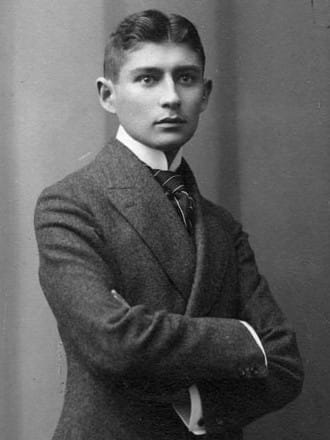Kafka's profound parable explores connection, love, and the transformative force of intentional bonds, urging us to embrace change and growth.
Delve into the poignant narrative woven by Franz Kafka, the maestro of existential storytelling. In the heart of Berlin, a chance encounter between Kafka and a distressed girl unraveled a tale transcending time—a story of loss, love, and the profound connections that shape our lives.
Franz Kafka's works are renowned for their exploration of existential themes, delving into the complexities of human existence and the enigmatic nature of reality. Through his distinctive narrative style and surreal imagery, Kafka invites readers into a world where the boundaries between dreams and reality blur, prompting profound reflections on the human condition.
In this narrative, Kafka's encounter with a distressed girl serves as a catalyst for a deeper exploration of the themes that permeate his work. As the story unfolds, readers are drawn into a captivating journey of self-discovery, grappling with questions of identity, alienation, and the search for meaning in an absurd and indifferent world. Through Kafka's masterful storytelling, we are reminded of the enduring power of literature to illuminate the depths of the human soul and provoke thought long after the final page is turned. "The Road Not Taken" by Robert Frost: Navigating Life's Choices
The Tale Unfolded
At the age of 40, Kafka, a solitary figure, stumbled upon a tearful girl mourning her lost doll in a Berlin park. Their quest to find the doll initiated a unique relationship. Kafka, promising to resume the search the next day, embarked on a journey that surpassed the bounds of reality.
Each encounter with the girl became a chapter in a story scripted by Kafka. Letters, ostensibly written by the doll, unveiled a world of adventures and conversations. The girl, enchanted by the doll's tales, found solace in this imaginary realm crafted by Kafka's empathetic pen.
Upon Kafka's return with a new doll, the girl, noticing its dissimilarity, received another letter from the doll. In it, Kafka penned profound words: "My travels have changed me." This marked a transformative moment, capturing the essence of inevitable change and its role in the cycle of love.
Lessons Learned
1. Embracing Change
Kafka's narrative underscores the inevitability of change. Like the doll's transformative journey, change is a constant force that shapes and molds our lives.
2. The Power of Imagination
The imaginative letters created by Kafka showcased the power of storytelling. Imagination becomes a vehicle for solace, healing, and the creation of alternative realities.
3. Love's Resilience
Kafka's poignant message, "Everything you love will probably be lost, but in the end, love will return in another way," resonates with the resilience of love. It evolves, adapts, and finds new expressions even in the face of loss.
4. Connection Transcends Reality
Despite the physical absence of the doll, the connection forged through Kafka's narrative endured. It highlights the intangible yet profound nature of human connection that transcends physical presence.
5. Conscious Creation of Connection
Kafka's intentional crafting of the narrative signifies the power we hold in consciously shaping our connections. Through empathy and creativity, we can transform pain into wonder and love.
Quotes that Echo
1. "My travels have changed me." - Franz Kafka
2. "Everything you love will probably be lost, but in the end, love will return in another way." - Franz Kafka
Frequently Asked Questions
1. Did Kafka intend the story to be a parable?
While Kafka's precise intentions remain a subject of interpretation, the story's allegorical nature aligns with Kafka's penchant for exploring profound themes.
2. What is the significance of the doll in the story?
The doll serves as a symbolic conduit for connection and transformation. Its physical absence underscores the intangible yet enduring nature of relationships.
3. How does the story reflect Kafka's worldview?
Kafka's worldview, steeped in existentialism, emerges through the narrative's exploration of change, love, and the transformative power of human connections.
4. Why did Kafka choose a doll as the central motif?
The doll serves as a metaphor for the mutable nature of existence. Its symbolic journey reflects the fluidity and adaptability inherent in life.
5. What message does Kafka convey through the girl's discovery of the letter years later?
The discovery of Kafka's letter encapsulates the enduring impact of intentional connections. It reinforces the idea that love finds new expressions, even in the face of temporal loss.
Conclusion
In Kafka's parable of connection, we find a timeless narrative that invites reflection on the impermanence of life, the resilience of love, and the transformative power of intentional connections. As we navigate the intricacies of existence, let Kafka's tale resonate—a gentle reminder that, in the ebb and flow of life, love returns in myriad ways, echoing through the corridors of our shared humanity.









COMMENTS